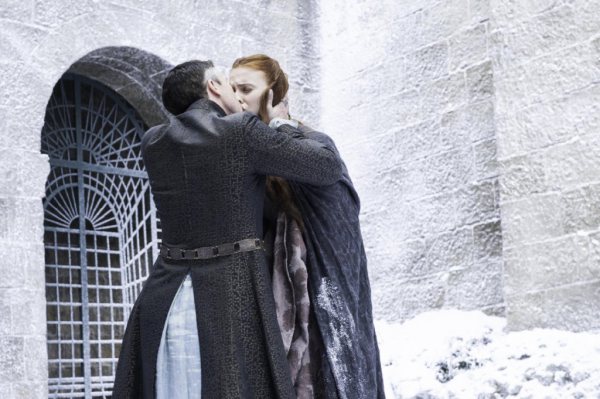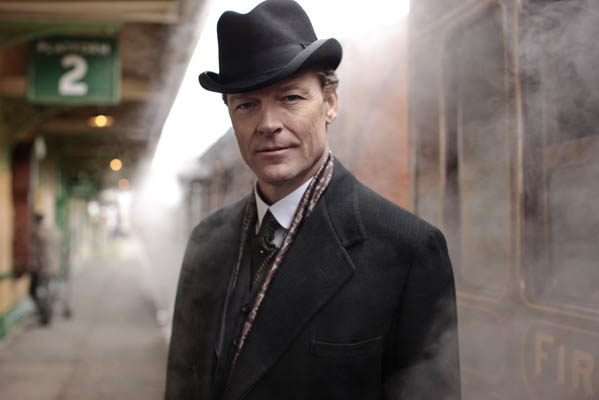Game of Thrones Season 5 Recap: Episode 3
Written by Ian Thomas Malone, Posted in Blog, Game of Thrones
This recap features analysis from a devoted book fan. Spoilers will largely be kept to comparisons between the show and the books within the episodes themselves, but if you hate spoilers you should probably not read these articles. I encourage you to subscribe so you never miss a recap. Thank you for reading.
Many of the changes from the books have been for one simple reason. Screen time. George R.R. Martin is perfectly content to have certain characters disappear for multiple books at a time, but that doesn’t really work in show business with actors who will find other work if their roles are greatly reduced for full seasons. From a creative standpoint, it also makes sense to give characters something to do. There’s quite a lot of sitting around doing nothing or wandering around doing nothing in A Feast for Crows and A Dance With Dragons.
Sansa and Littlefinger do not go to Winterfell in the books. Not yet at least. They sit in the Vale and hang out with Sweetrobin. Littlefinger does a little bit of plotting, but Sansa remains Alayne and nothing really happens besides some plotting to marry Sansa off to Harrold Hardying, who’s the heir to the Vale behind Sweetrobin. Sample chapters from The Winds of Winter show that this stasis continues at least into the early parts of that book.
So the show decides to do something interesting. Hard to blame D&D for deciding that sitting around didn’t make for great television. Only this plotline doesn’t really make a whole lot of sense.
Littlefinger is taking too much of a risk on Roose and Ramsay. Putting aside the fact that Cersei is weaker than ever, it’s hard to imagine a single scenario where whoever is in control on King’s Landing isn’t furious that Littlefinger has been secretly hiding a girl wanted for regicide. The fact that he brings her to marry into the most dishonorable House in Westeros not named Frey is simply ridiculous.
Littlefinger is not an idiot, but his involvement with the Boltons complicates this. It would be completely out of character for him to do a background check on Ramsay and he wouldn’t have to do very much digging to find out what a monster he is. Even putting aside his weird infatuation with Sansa, it’s unfathomably foolish of him to put any amount of trust in Roose and Ramsay. While it makes sense from a storyline perspective to give them all something to do, it doesn’t really add up.
Book fans have often noted that much of Littlefinger’s scheming is perfectly in line with what Stannis needs to take the throne. With the Iron Bank of Braavos now backing the Mannis, it seems even more likely that the two should want to put aside their differences. If Stannis can’t have Jon Stark ruling Winterfell, Sansa is the next best thing (perhaps even more so given that she isn’t a bastard currently sworn to the Night’s Watch).
I criticized the handling of Jon’s election to Lord Commander in the last recap. Here I’ll criticize the execution of Janos Slynt. Lord Slynt will not be missed by many, whether it be characters or people watching. Problem is that you kind of feel bad for him as his head gets chopped off.
From the moment Slynt arrives at the Wall in the books, which is right after the Battle of Castle Black and not well before in the show, he plots to have Jon killed. Slynt had to die and in killing him, Jon earns the respect of both Stannis and Ser Alliser. That seems to be accomplished here as well, but Slynt was never really made to look like much of a threat. Maybe this is not a big deal, but I wasn’t a big fan of the way it was handled.
Davos’ speech to Jon was certainly interesting. It’s looking like the Night’s Watch might head south of the Wall, which would be a major deviation. While that would be odd, I am certainly not against it.
The Cersei/Margaery/Tommen feuding isn’t terribly interesting right now as it’s pretty predictable, but I’m looking forward to seeing how the High Sparrow gets involved. He isn’t in the books much, but casting Jonathan Pryce is all the reason you’d need to feature him more often.
Arya and Tyrion’s plotline stay mostly true to the books beyond deviations that already happened. I’ve been looking forward to seeing Tyrion and Ser Jorah together as Peter Dinklage and Iain Glen are two of the show’s best actors. Their interactions in ADWD are among the best aspects of the book.
Varys’ future is a complete mystery. I wonder if he’ll continue on his way to Dany or if he’ll head back to Westeros. With no Aegon in the show, the former seems likely, possibly before Tyrion and Ser Friendzone arrive.
No Dany, which is probably for the best as the show’s version of the Meereense Knot needs time to unravel. Could’ve used less Brienne this episode as her thoughts on Renly are old news and that was screen time that could’ve been used elsewhere. I think Podrick will die, if for any other reason than it will make Brienne sad.
No Jaime or Bronn either. I’d love to see what’s going to happen with this Dornish plot, which looks pretty weak compared to the Dornish Master Plan in the books. That doesn’t appear to be something that will be resolved this season.
All in all I think this was a solid episode. It looks like the show is building more for the future right now and that’s not necessarily a problem. The changes are interesting and it’s hard to judge them until we see how it all plays out.












